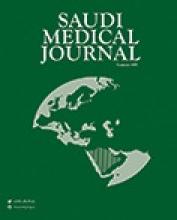Abstract
OBJECTIVE: Nasal intermittent positive pressure ventilation (NIPPV) has widely been used in neonates to prevent extubation failure and apnea. This pilot study was carried out to look at the early use of NIPPV to avoid intubation.
METHODS: The study was carried out over a period of 3 months from August 2003 to October 2003 at the Royal Hospital, Muscat, Sultanate of Oman. The neonates with clinical signs of moderate to severe respiratory distress were given a trial of early NIPPV based on the avoid-intubation protocol. Inclusion, exclusion and failure criteria with general procedure were made clear to all medical and nursing staff and the protocol was posted in the unit for further time to time referral.
RESULTS: A total of 16 neonates met the inclusion criteria for early NIPPV trial. Out of these, 13 (81%) had a successful NIPPV. The mean age of entry was 0.95 hours; however, the mean duration of NIPPV was 23 hours. No NIPPV related complications were noted in the study group.
CONCLUSION: We concluded that NIPPV is an appropriate mode of ventilation in neonates requiring respiratory support. The major advantage of NIPPV is the non-invasive mechanics. It is also less expensive and less labor intensive. Further randomized controlled trials with larger sample size are warranted to confirm our findings.
- Copyright: © Saudi Medical Journal
This is an open-access article distributed under the terms of the Creative Commons Attribution-Noncommercial-Share Alike 3.0 Unported, which permits unrestricted use, distribution, and reproduction in any medium, provided the original work is properly cited.






